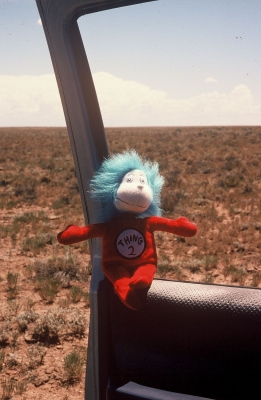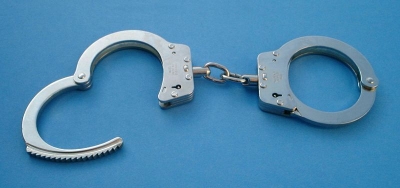15 + 18 points
Work is So Strange by Boreal Nemeton
September 12th, 2010 10:43 AM
I work in the court system, and recently had the occasion to see the following transpire:
During a motion hearing, the defendant decides to testify. These hearings work just like a trial, except that there's no jury, and the judge is deciding something other than the defendant's guilt or non-guilt. In this case, the judge was asked to decide whether the police had stopped and searched the defendant illegally.

At the end of the defendant's testimony, the Judge said to him, "Mr. Smith†, there's just one thing that troubles me about your testimony. It seems to me that you have decided to come in here and tell a story that gets you off, but that you're not willing to give up your drug dealer. That bothers me."
Mind you, the identity of the defendant's drug dealer had nothing to do with this. And any judge should know that nobody will ever give up his drug dealer in open court.
"Sure thing," the defendant replied. Whaddya wanna know about my drug dealer?"
"Who is he?" The judge asked.
"His name is Bob."
"Bob who?"
"Judge, he's my drug dealer! I don't know his last name! His name's Bob. He rides a pedal bike on Mulberry Street."
"Well, how do you get in touch with him when you need to buy drugs?"
"I just wait for him."
"Do you have to call him on the phone to arrange it?"
"No, I just wait for him to ride by."
"So what, you just wait for him to ride by and then you call out "hey Bob, I wanna buy some drugs?'
"Yeah, that's about right."
"I don't believe you."
"Judge, have you seen Mulberry Street? It's an open-air drug market!"
Mulberry Street is, in fact, an open air drug market, but the Judge hadn't seen it. He announced that he didn't believe Mr. Smith's testimony, but he still didn't want to decide the motion. Never mind that we, the taxpayers pay him to decide hard things. He said that if the defendant didn't make him decide, he'd give him a good plea deal. He asked the lawyers to go work something out. A few minutes later, the lawyers came back with an agreement, but the judge thought it was too tough. They had agreed to 2 years' probation, but the judge was willing to give the defendant a deferred judgment for six months. As long as he stayed out of trouble, the case would be dismissed.
The defendant said he was fine with this so long as he didn't have to do urine tests. Nobody had said a word about urine tests until just then, but now they were on the table. Mr. Smith explained that he has a shy bladder, and that he couldn't pee in a cup if his life--let alone his freedom--depended on it. He said he could only do drug testing if the judge ordered that he could give his sample in private. Normally a probation officer would watch the defendant urinate to make sure that he was supplying none other than his very own piss.
The strangest thing--the judge went along with it. He really didn't want to decide that motion.
===
†All names have been fictionalized.
During a motion hearing, the defendant decides to testify. These hearings work just like a trial, except that there's no jury, and the judge is deciding something other than the defendant's guilt or non-guilt. In this case, the judge was asked to decide whether the police had stopped and searched the defendant illegally.

At the end of the defendant's testimony, the Judge said to him, "Mr. Smith†, there's just one thing that troubles me about your testimony. It seems to me that you have decided to come in here and tell a story that gets you off, but that you're not willing to give up your drug dealer. That bothers me."
Mind you, the identity of the defendant's drug dealer had nothing to do with this. And any judge should know that nobody will ever give up his drug dealer in open court.
"Sure thing," the defendant replied. Whaddya wanna know about my drug dealer?"
"Who is he?" The judge asked.
"His name is Bob."
"Bob who?"
"Judge, he's my drug dealer! I don't know his last name! His name's Bob. He rides a pedal bike on Mulberry Street."
"Well, how do you get in touch with him when you need to buy drugs?"
"I just wait for him."
"Do you have to call him on the phone to arrange it?"
"No, I just wait for him to ride by."
"So what, you just wait for him to ride by and then you call out "hey Bob, I wanna buy some drugs?'
"Yeah, that's about right."
"I don't believe you."
"Judge, have you seen Mulberry Street? It's an open-air drug market!"
Mulberry Street is, in fact, an open air drug market, but the Judge hadn't seen it. He announced that he didn't believe Mr. Smith's testimony, but he still didn't want to decide the motion. Never mind that we, the taxpayers pay him to decide hard things. He said that if the defendant didn't make him decide, he'd give him a good plea deal. He asked the lawyers to go work something out. A few minutes later, the lawyers came back with an agreement, but the judge thought it was too tough. They had agreed to 2 years' probation, but the judge was willing to give the defendant a deferred judgment for six months. As long as he stayed out of trouble, the case would be dismissed.
The defendant said he was fine with this so long as he didn't have to do urine tests. Nobody had said a word about urine tests until just then, but now they were on the table. Mr. Smith explained that he has a shy bladder, and that he couldn't pee in a cup if his life--let alone his freedom--depended on it. He said he could only do drug testing if the judge ordered that he could give his sample in private. Normally a probation officer would watch the defendant urinate to make sure that he was supplying none other than his very own piss.
The strangest thing--the judge went along with it. He really didn't want to decide that motion.
===
†All names have been fictionalized.















That sounds like a bizarre bazaar.
I have worked myself as a lay judge in a criminal court, but had the fortune to be assigned to a judge that, while very practical, also was very just and objective. After having visited a few cases in a civil court before, I was positively impressed.